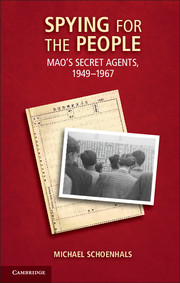7 - Agent Running
Beijing Rules
Published online by Cambridge University Press: 05 January 2013
Summary
The CMPS inclined toward a holistic view of agent running. While for didactic purposes it may have been prepared to separate the process into its constituent parts, including direction and control, briefing and debriefing, agent welfare, and so on, in the operational real world these parts were so closely intertwined that it was impractical to isolate them. How well or how badly any one part was managed inevitably impacted on the quality of the whole. In this respect, problems on the ground were plentiful. “In some public security sectors,” one 1952 report from the Northeast Railroad Public Security Bureau lamented, “not only does the officer in charge of the sector not personally exercise control [of the recruited agents], even his section chiefs show no concern and delegate [the running of] agents to the rank and file, in this way preventing efficient control, utilization, and hence use of agents in the struggle against the enemy.” The CMPS leadership expressed its disquiet on innumerable occasions after 1949 concerning how agent running was being managed, pointing out that agents without direction and control were agents in name only.
The situation was undoubtedly better in some sectors than in others, and better in some parts of China than in others. Where it was mismanaged, it may have resembled the state of economic protection in Jiangsu province, where, according to the provincial Bureau of Public Security's self-critical assessment of October 1954, “there are serious deficiencies with respect to the direction of agents and a state of chaos prevails wherein things are just left to drift: in the provincial-level organs in the trade and finance sector, contact has been altogether lost with approximately 60 percent of agents.” In one of the province's factories, some twenty agents had been recruited, but more than a year after having agreed to serve and having had their Agent Registration Forms opened, not a single one of them had actually been contacted again, much less been given or executed an actual operational task.
- Type
- Chapter
- Information
- Spying for the PeopleMao's Secret Agents, 1949–1967, pp. 205 - 232Publisher: Cambridge University PressPrint publication year: 2013

